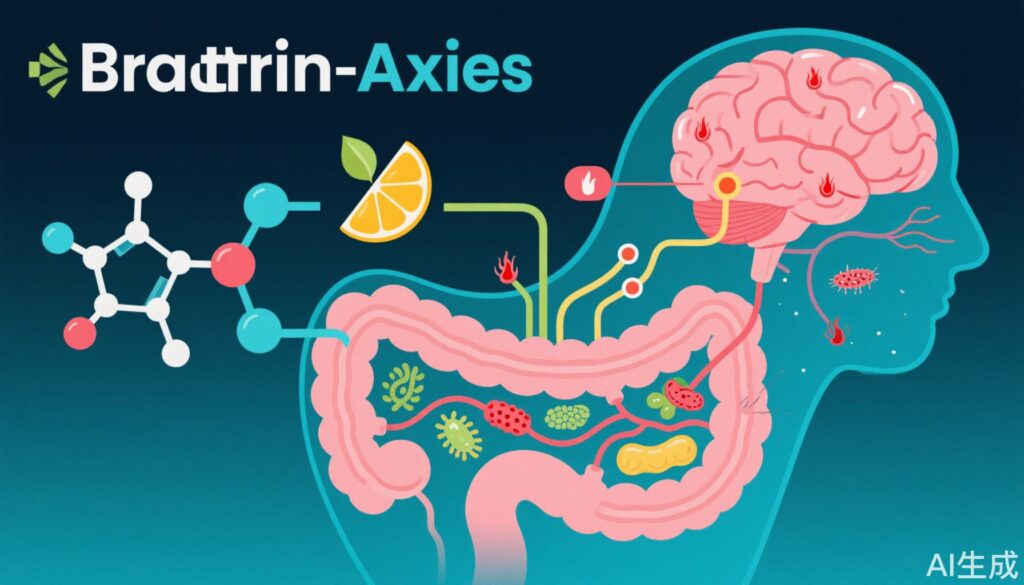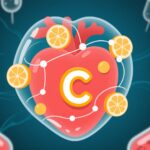Highlights
- Vitamin C supplementation in healthy young adults with suboptimal vitamin C status leads to significant improvements in mental vitality, as measured by cognitive performance and subjective engagement.
- These effects are mediated by specific alterations in gut bacterial taxa, particularly a reduction in Desulfovibrio, which is associated with decreased systemic inflammation.
- The findings underscore a novel gut-brain-immune mechanism linking nutrition, microbiota composition, and psychological well-being.
Study Background and Disease Burden
The bidirectional relationship between nutrition, the gut microbiome, and mental health has emerged as a frontier in integrative medicine. Suboptimal vitamin C status—prevalent even in developed nations—has been associated with fatigue, decreased cognitive performance, and reduced work engagement. Despite vitamin C’s well-established antioxidant role, its effects on the gut-brain axis and subsequent mental health outcomes remain poorly defined. Understanding these mechanisms may unlock new interventions for supporting cognitive vitality and overall well-being in young adults, a demographic frequently experiencing high occupational and lifestyle stress.
Study Design
This was a randomized, double-blind, placebo-controlled trial conducted in healthy young adults aged 20-39 years with serum vitamin C levels below 50 μM. Participants (n = 40; vitamin C group, n = 21; placebo group, n = 19) received either 500 mg vitamin C or matching placebo twice daily for 4 weeks. The primary aim was to determine the effects of vitamin C supplementation on mental vitality indices (including Stroop test performance, work engagement, and serum BDNF levels) and to explore the mechanistic role of the gut microbiome and immune markers in mediating these effects. Gut microbiota profiles were characterized by 16S rRNA sequencing, while serum microbial metabolites, cytokines, and neurotransmitters were quantified using advanced immunoassays and mass spectrometry. Peripheral blood monocyte subsets were evaluated by fluorescence-activated cell sorting.
Key Findings
Vitamin C Modifies Gut Bacterial Composition
Vitamin C supplementation did not significantly change overall microbiota alpha or beta diversity. However, targeted analysis revealed significant time-by-group interactions in four taxa: three gram-positive bacteria (family Bacillaceae, genera Bifidobacterium and Anaerotruncus) and one gram-negative bacterium (genus Desulfovibrio). Notably, the vitamin C group demonstrated greater increases in Bacillaceae (L2FC = 0.376 vs. -1.275, p = 0.027) and Anaerotruncus (L2FC = 0.576 vs. -0.638, p = 0.034) relative to placebo. For Desulfovibrio, vitamin C supplementation was associated with a significant decrease (L2FC = -0.009 vs. 0.238, p = 0.023), counteracting the increase seen in the placebo group.
Functional Microbial Pathways and Metabolites
Predictive functional analysis suggested that vitamin C-induced shifts in microbial taxa corresponded with changes in key microbial metabolic pathways, validated by alterations in serum metabolites. These pathways included the Entner-Doudoroff pathway, polyamine biosynthesis II, and arginine-polyamine biosynthesis. Correlative analysis linked these microbial changes to improvements in mental vitality indices, including reaction time on cognitive testing, reduced self-reported fatigue, and increased serum BDNF—a marker of neuroplasticity.
Linking Microbiota Changes to Mental Vitality
Subgroup analysis within the vitamin C cohort distinguished responders from non-responders based on the extent of gut microbial alterations. Critically, a pronounced reduction in Desulfovibrio abundance emerged as the defining feature among those who experienced the greatest gains in mental vitality. This finding positions Desulfovibrio as a potential microbial marker for predicting psychological response to nutritional interventions.
Immunological Effects and Inflammation
Vitamin C supplementation led to suppression of inflammatory responses, as evidenced by decreased levels of LBP (an amplifier of LPS-induced inflammation) and modulation of peripheral monocyte subsets and serum cytokines (IL-6, IL-8, IL-10, IFN-γ, TNF-α). These immunological shifts were particularly prominent in participants with the largest reductions in Desulfovibrio, suggesting a direct link between microbiota modulation and immune status.
Expert Commentary
This study provides robust mechanistic evidence that vitamin C exerts beneficial effects on mental vitality not merely through direct antioxidant action, but via targeted modulation of gut microbiota and attenuation of inflammation. The identification of Desulfovibrio as a potential mediator of cognitive and psychological benefits is particularly compelling, given prior associations of this genus with pro-inflammatory states. While the trial’s modest sample size and short duration limit generalizability, its rigorous design and integration of multi-omics profiling set a new standard for nutritional neuroscience research. Future studies should explore longer-term outcomes, potential synergy with other micronutrients, and whether Desulfovibrio-targeted interventions could benefit broader populations at risk for cognitive decline or mood disorders.
Conclusion
Vitamin C supplementation in young adults with marginal vitamin C status enhances mental vitality through a novel gut-brain-immune mechanism, primarily involving reduction of pro-inflammatory Desulfovibrio bacteria. These results underscore the importance of considering gut microbiota as both a mediator and a therapeutic target in nutritional interventions aimed at improving mental health and cognitive function. Routine assessment of vitamin C status and tailored supplementation strategies may offer a simple, low-risk approach to supporting psychological well-being in at-risk populations.
References
1. Sim M, Hong S, Jung MH, Choi EY, Hwang GS, Shin DM, Kim CS. Gut microbiota links vitamin C supplementation to enhanced mental vitality in healthy young adults with suboptimal vitamin C status: A randomized, double-blind, placebo-controlled trial. Brain Behav Immun. 2025 Aug;128:179-191. doi: 10.1016/j.bbi.2025.03.032. Epub 2025 Apr 3. PMID: 40187667.
2. Ochoa-Repáraz J, Kasper LH. The second brain: Is the gut microbiota a link between obesity and central nervous system disorders? Curr Obes Rep. 2016;5(1):51-64.
3. Mayer EA, Tillisch K, Gupta A. Gut/brain axis and the microbiota. J Clin Invest. 2015;125(3):926-938.
4. Smith K, Zubair N, Bissell P. Vitamin C status and mental health in young adults: prevalence and potential mechanisms. Nutrients. 2022;14(2):384.



